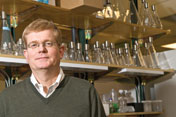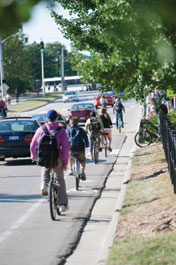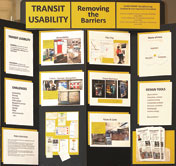Transforming Transportation Research Corridor Consortium


Tim Potter of MSU Bikes and Gus Gosselin of the physical plant with award designating MSU as a "bicycle friendly university" in 2011
Michigan State University has a lead role in providing research-based insights and innovative solutions for an industry that is both significant in Michigan's history and vital to its future.
"There is new opportunity...to grow an industry and an economy that will supply the next generation of connected, sustainable transportation."
Susan Zielinski
The University Research Corridor's partner institutions—MSU, the University of Michigan, and Wayne State University—established the Transforming Transportation Research Corridor Consortium in 2010 to accelerate the implementation of innovative transportation systems at the intersection of technology, livability, labor and supply chain, economic and environmental sustainability, social equity, and public policy.
"The Consortium has emerged to fill a major gap in systematic research on transforming the future of transportation," said Hiram E. Fitzgerald, MSU associate provost for university outreach and engagement. "We are a catalyst for collaborative partnerships, anchored in scholarship, that include researchers, industry practitioners, and policymakers."
Leadership is provided by Fitzgerald, along with Susan Zielinski, managing director of Sustainable Mobility and Accessibility Research and Transformation (SMART) at the University of Michigan's Transportation Research Institute, and Allen Batteau, associate professor of anthropology at Wayne State University. MSU College of Social Science dean Marietta Baba has also been closely involved.

Poster display at Transforming Transportation conference, April 2011 in Detroit
Transportation industries have supported generations of workers and characterized the core identity of many communities and regions, particularly in Michigan. As these industries, technologies, and cultures change, leaders from all sectors are searching for insights and strategies to address the profound contemporary changes experienced in Michigan, and their impacts on Michigan's future.
"Michigan should have a pivotal role in that transformation," said Zielinski. "There is new opportunity on the horizon to grow an industry and an economy that will supply the next generation of connected and sustainable transportation systems for an urbanizing and increasingly complex world."
In April 2011 the Consortium held an inaugural summit meeting, "Transforming Transportation: Economies and Communities," in Detroit. More than 200 attendees from seven countries, including business and labor leaders, policymakers, entrepreneurs, and research scholars, gathered during plenary and working sessions to understand and advance transportation in Michigan, the surrounding region, and across the globe.
"As residents and workers in the city of Detroit, our faculty and students are on the front lines of the contemporary issues facing the transportation industry and facing our communities, and we have a shared interest in working together," said Batteau.
- Photograph courtesy of University Outreach and Engagement